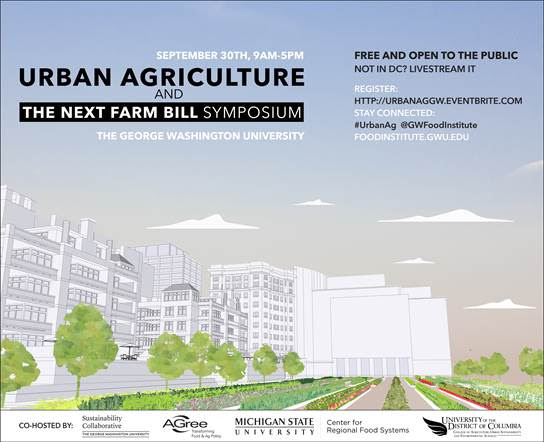Press release
UB and RUAF Announce International Launch of Global Database for City and Regional Food Policies
Release date: October 16, 2017
The University at Buffalo’s Food Systems Planning and Healthy Communities Lab and Community for Global Health Equity in partnership with RUAF (Global partnership for sustainable Urban Agriculture and Food systems) are pleased to announce the launch of the Global Database for City and Regional Food Policies. This database is the first publically available repository (database) of international sub-national food system policies in the world.
Over the past nine months, the partners have worked to develop a searchable database of city and regional policies developed and enacted by cities around the world. The project was conceived two years ago in response to the demand from many cities for support to their own food policy design processes. The database is a public internet resource maintained on the UB Food Lab website, which can be accessed online here:
Urban and regional food system sustainability and resilience are a growing international concern. Due to challenges related to rapid urban growth; growing food and nutrition insecurity; unbalanced food availability, distribution and access; environmental degradation, resource scarcity and climate change; and unsustainable production and consumption patterns, including generation of food waste, sub-national governments around the world are grappling with how to build a sustainable, equitable food system for their residents. City and Regional food systems enable the growing, processing, distribution, and acquisition of food, and management, reduction, and recovery of excess food and food-related waste in urban and sub-national territories. The United Nation’s 2030 Sustainable Development Goals (SDGs) and UN-Habitat’s New Urban Agenda recognize that sustainable development cannot be achieved without building more resilient cities. International declarations like the
The Global Database for City and Regional Food Policies fills an existing gap in information. Governing bodies at sub-national levels – town, village, city, municipal, regional, provincial, state – are becoming more aware of the need to support, encourage and regulate urban and peri-urban agriculture activities as well as other related food systems and land use issues. Many sub-national governments across the globe express a clear demand for information and knowledge and concrete policy examples to help them develop and enact food-related plans and policies. Without a single, searchable resource of existing policies, sub-national governments struggle to find an accessible retrieval location for examples of policies that strengthen food systems, and which are appropriate for their level of capacity and influence.
Drawing on prior work completed on the Growing Food Connections database of policies from the United States and Canada, the team developed the searchable Global Database for City and Regional Food Policies that provides copies of legislation, plans, funding allocations, or other public policy actions adopted by sub-national governments around the world. The goal of the database is to emphasize cross-national learning both between Global North and Global South, and among countries in the Global North and South. The database stores PDFs of actual adopted and/or enacted policies, regulations, plans and ordinances on a range of food systems topics ranging from food production, processing, consumption, and food waste management. Researchers from the UB Food Lab and RUAF have populated the database with an initial set of policies provided by RUAF. Each policy is coded with a series of categorical search terms that allow users to prioritize the type of policy they wish to find through the Advanced Search feature. The database includes categories such as country, language, policy type, food system sector, level of government, population size, and spatial distinction (urban, rural, peri-urban). In addition, the research team assigned a set of keywords to each policy, so that users may search via the Basic Search tool, which features an auto-fill component of the keywords for users with interest in general topic areas.
Fore greater usability of the database for a global audience, policies are included in the language of the associated jurisdiction. Users can access the link to the database on various international forum websites, including www.ruaf.org, www.iclei.org/cityfood, and others.
The policy database will be updated with additional policies regularly. The UB Food Lab and RUAF will engage local policy-makers and planners to provide insight and local knowledge on the policies, enhance the coding process, and help disseminate the resource.
The team welcomes any local governments or support organizations from around the world to submit adopted, sub-national policies for coding and inclusion on the database at any time. Policy submissions (in PDF form) can be sent to the Food Lab team at
Sub-national food systems policies from the United States and Canada are available on the Growing Food Connections website at
The development and creation of the database was made possible by support from the University at Buffalo (UB), Community for Global Health Equity (CGHE), Food Systems Planning and Healthy Communities Lab, and RUAF (Global partnership for sustainable Urban Agriculture and Food systems). Special thanks goes to Marielle Dubbeling, Executive Director of RUAF; Dr. Samina Raja, Principal Investigator of the Food Systems Planning and Healthy Communities Lab and Co-lead of CGHE at UB; Doug McCullum, Web Manager for the UB School of Architecture and Planning; Daniela Leon, and Grace O’Connor, Joe Quinn, Erin Sweeney and Danielle Vazquez, Research Interns and Assistants at the Food Systems Planning and Healthy Communities Lab.


